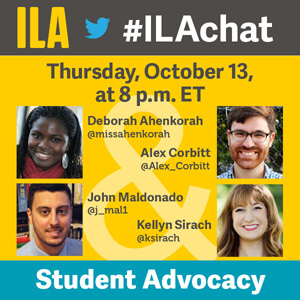 Every adult working in a school goes to work each day because he or she wants to help students—help them learn and support them as they grow into lifelong learners and engaged citizens.
Every adult working in a school goes to work each day because he or she wants to help students—help them learn and support them as they grow into lifelong learners and engaged citizens.
But in today’s world, we know this means more than reviewing the everyday curriculum. Students are facing unique challenges within and outside of the classroom, and educators are finding themselves not only teaching but also advocating for students. For October’s #ILAChat, our panel will share their experiences as young literacy leaders and how they advocate for students around the world.
This month’s #ILAChat on Thursday, October 13, at 8:00 p.m. ET, will feature a panel of 2016’s 30 Under 30 honorees.
Although most educators know the need to put diverse books in the hands of students, the reality is that often they are surrounded only by characters and plots that do not reflect their ethnicity or culture. As these students learn to read, it’s possible for them not to know what’s missing. That happened to Deborah Ahenkorah Osei-Agyekum as she grew up in Ghana.
As a student at Bryn Mawr College in Pennsylvania, she cofounded a student-led organization, Project Educate in Africa (PEIA), to provide books to African children. As she was organizing a book shipment, it hit her: “I saw a book with a black girl on the cover,” she said in Literacy Today. “I realized that out of the thousands of books we had shipped, this was the first I saw that represented the people the books were going to. It dawned on me that apart [from how] many children in Africa lacked access to books, there was another problem, possibly the root problem, which is: There are not enough diverse children’s books being produced in Africa, and they are not easily accessible to all children.”
From there she founded the Golden Baobab Prize with her mentor, Rama Shagaya. They hoped to inspire the creation of African stories written by Africans for children. A publishing and multimedia company, African Bureau Stories, and the nonprofit Golden Baobab grew from the prize, and now they are producing these stories, not just encouraging them.
“It’s absolutely critical that there is balance and representation,” Ahenkorah Osei-Agyekum said when she won the 2015 Grinnell College Innovator for Social Justice Prize given by Grinnell College in Iowa. “It’s not OK that children in some parts of the world wake up, pick up books, and see themselves and their cultures and their language, their slang, and their food represented in it and children in another part of the world...pick up books and only see other people.”
Bronx, NY–based teacher Alex Corbitt makes lessons come to life in his classroom, bringing outside issues into school to help his students become literate on many levels.
“My job as an educator is to empower students to become compassionate, critically engaged citizens,” Corbitt said in an interview for Literacy Today. “Being ‘literate’ is more than having the ability to read and write. Literate citizens are well informed, wary of media bias, and committed to improving their communities. I bring the ‘real world’ into my classroom so that students can engage in literacy practices that define their daily lives and future careers.”
Fellow New York educator John Maldonado uses technology to level the playing ground for his special education students, including those with autism.
“The concrete, predictable cause-and-effect nature of technology is something that my students easily understand and feel comfortable with,” Maldonado said. “Technology allows my students to move past whatever communicative difficulties they may have and express themselves in whatever way is the most effective for them.”
By engaging nearly the entire Google for Education suite, Maldonado gives his students tools with which they are familiar and empowered.
Kellyn Sirach, a teacher in a rural Illinois school, saw that her students faced several obstacles on the road to literacy. There was no public library and only a tiny school library, and middle school students were already reading far below their grade level. As a response, she formed a sixth- through eighth-grade book club called The Booth Bookies, established a student newspaper dedicated to promoting literacy awareness throughout the community, and created the Million Word Club competition to see which grade could read 1 million words first.
She also engaged the community by establishing a Little Free Library and continues her efforts to give her students the power of literacy.
Join our panel to learn how these individuals make an impact in their student’s lives through advocacy and, in turn, how you can bring advocacy to your practice. Be sure to follow #ILAChat and @ILAToday on Oct. 13 at 8:00 p.m. ET to join the conversation.